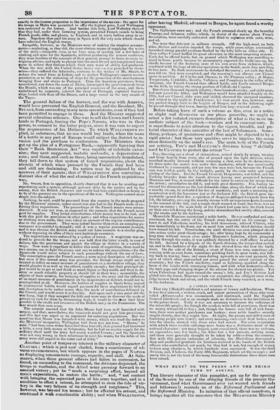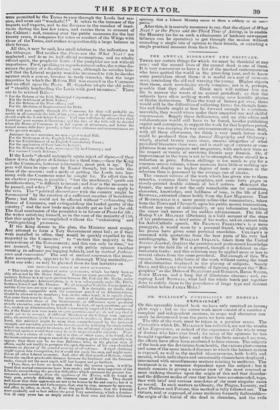WHAT NEXT? OR THE PEERS AND THE THIRD TIME OF
ASKING.
THE literary character of this pamphlet, got up for the opening of the Session by one of the obliging friends of the present Go- vernment, (and what Government ever yet wanted such friends and followers?) reminds us of the Reformed Parliament and the Reformed Ministry. In imitation of that official manifesto, it brings together all the measures that the MELnoutt:sE Ministry
were permitted by the Tories to pass through the Lords last ses- sion, and cries out " wonderful !" It refers to the increase of the imports and exports, and to the decrease in the number of insol- vents during the last few years, and carries them to account of the Cabinet ; and, running over the public measures for the last twenty years, it compares the votes or conduct of the Whigs with those of the Tories, and strikes unquestionably a large balance in their favour.
All this, it may be said, has small relation to the indications in the titlepage. But neither the Peers nor the What Next I are neglected ; and from its half-oilicial assumptions, and its wholly official spirit, the prophetic hints Of the pamphlet are not without importance. First, speaking as regards eat ural order, the writer dis- cusses the policy of a dissolution : now, although he satisfies him- self that the Liberal minority wouid be increased to 130, he decides against such a course, because he truly remarks, that the large majorities by which the Reform 13111 was carried in the Commons had no effect upon the Peers. IL, therefore adopts the old policy of " steadily bombarding the Lurds with good measures: There are to be revived Mik-
a For the Reform of the Itish NInnicipal Corporations ; For the Settlement of Irish Tithes ; For the Reform of the Post •fitlice ; and Fur the Abolition of 1'1'mi:influent for Debt.
These will pass rapidly through the Commons, for they will probably re- semble in all essentials the bill- of last ye,r; and it is of importance that they should reach the Lords before Etter. Fon time vill thus be allowed for their Lordships' most mature deliberation ; awl the fate of the bills will be decided when the llouse of Commons is in full vigour of attendance, and before the annual money. bills have passed ; a time when addresses and remonstrances are of the greatest weight.
Amongst the new measures, we may esprq to find Bills
For the Settlement of the Engli-h Church. rates ;
For the Establishment if Lit 1.1141511 Constabulary Force ; For the application of 1)001, kw. to It Ian I; For the Reform of the Law, more esinlly in Chancery ; and
For various Church Reim ins.'
If the Lords " should unhappily again reject all these,—if they throw down the glove of defiance fur a third time,—then the King and the Commons, however reluctantly, must pick it up.- The pear will then be ripe—not by Easter though, but towards the close of the session ; and a mode of getting the Lords into har- mony with the Commons must be sought for. To effect this by an elective rrocess, is possible ; " but the machinery," quoth our manifesto-man, "is difficult to in ; and how is the measure to be passed, and when T"lhe bow and when objections apply to the veto. The " political discoritince with the country might be harmonized " by the creation of a sufficient number of hereditary Peers ; but this could not be effected without " exhausting the House of Commons, and extinguishing the landed gentry of the country ;" and the new lords might shortly get as bad as the old. The final conclusion of the pamphlet is in favour of Peers for life ; the writer satisfying himself; as in the case of the majority of 130, that this might be accomplished without the "exhausting " and " extinguishing " processes. If the King demur to the plan, the Ministry must resign. Any attempt to form a Tory Government must fail; or if they were installed in ottice, they would be quickly expelled by the majority in the Commons : " to " sustain this majority is the corner-stone of the Government ; and this can only be done," we are assured, " by keeping even with public opinion (neither running in advance nor lagging behind), and by mutual forbear- ance and concession." The sort of mutual concession this mani- festo recommends, appears to be a thorough Whig mutuality,— all on one side; as may be gleaned from its last hortative on THE MINISTERIAL EOLICY OF OPEN Quesrioxs.
a This leads to The subject of OPEN OEEsTIONS, which has lately been so ably advocated by Mr. Henry Bulwer. There are many precedents. Parlia- mentary Rethrm w: s an open question between Mr. Fox and Mr. Burke, under Lord Rockingham's Administration, 3., it was subsequently under Mr. Pitt's, between himself and .Mr. Dundas. We all remember Catholic Emancipation ;
and the Corn-laws are now au open question. It is desirable, no doubt, that every latitude, compatible with the consistent march of an Administration, should be allowed to its members ; but, on the other hand, it is equally clear,
that some limit must be fixed. No active avowal of fundamental principles, which contradict those of the Government, or differences upon questions strictly executive, can safely be permitted. In fur, all open questions, riao ad hoe, weaken an Administration, which is necessarily suppwed to be uum lllll ous. So, if the Ballot now were made an open question—mot ac do not soy Mot it ought not to he so—yet. if different Members of the Cabinet took opposite sides, the moral flow (phi: Gorernment worth/ he trtakened. But, on the other Land, this mischief might be more than counterbalanced by the increased strength and cordiality gamed to the Government by widening the circle within which its members might be deism, and by the additional weight which each
individual opinion would than carry from its unquestionable sincerity. Prac-
tically, it is a choice of rids ; and if in this, or other cases, it be found, that the inconvenienees or dangers exceed the advantages, great as they specially may appear, then there can be no true Reformer who, in the present state of affairs, ought not readily to postpone the open discussion of his own cherished measure in .fhrour of the general seent it', of oil refIrms. A rigid obstinacy ?night expose him to suspicion, fur it could not carry his own, and might over- throw all other Liberal measures. Aud, after all, that march of Reform, which leaves the smallest practicable distance between the hindmost and the foremost ranks, though not the most rapid, will last longest and go furthest.
'rhos, then, we have no doubt, that when the session opens, it will be
found that mutual concessions have been made; and the more impatient of the Liberals, reconsidering the peculiar difficulties which surround the present Go- vernment, and recoiling from the applause of the Tories, will be found at Their post, actively defending the common cause of Reform. They should well know that their opponents are not to be beaten by fits and starts; but it is by patient cooperation and forbearance, that, step by step, measure by measure, and office by office, in short, by Time the great Ili:former, that the Liberals must gradually and so best reduce the great Tory ascendancy, which a domina- tion of sixty years has se deeply rootal in their own and their followers opinions, that a Liberal Ministry seems to them a robbery or an um.. pation."
After this, it is scarcely necessary to say, that the object of What Nevi? or the Peers and the Third Time of Asking, is to enable the Ministry (so far as such a ritacitnento of hackney newspaper fallacies can be operative) to get through the session without conceding a single iota of opinion to their friends, or extorting a single practical measure from their foes.



























 Previous page
Previous page